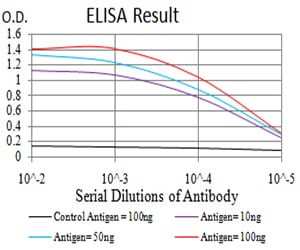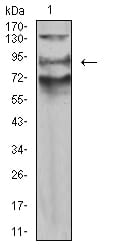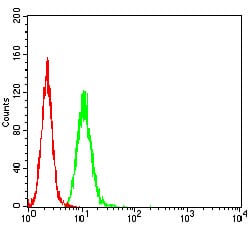


| WB | 咨询技术 | Human,Mouse,Rat |
| IF | 咨询技术 | Human,Mouse,Rat |
| IHC | 咨询技术 | Human,Mouse,Rat |
| ICC | 技术咨询 | Human,Mouse,Rat |
| FCM | 1/200 - 1/400 | Human,Mouse,Rat |
| Elisa | 1/10000 | Human,Mouse,Rat |
| Aliases | XB130; KIAA1914; CTB-1144G6.4 |
| Entrez GeneID | 84632 |
| clone | 2H6D1 |
| WB Predicted band size | 91.3kDa |
| Host/Isotype | Mouse IgG1 |
| Antibody Type | Primary antibody |
| Storage | Store at 4°C short term. Aliquot and store at -20°C long term. Avoid freeze/thaw cycles. |
| Species Reactivity | Human |
| Immunogen | Purified recombinant fragment of human AFAP1L2 (AA: 674-818) expressed in E. Coli. |
| Formulation | Purified antibody in PBS with 0.05% sodium azide |
+ +
以下是关于AFAP1L2抗体的3篇参考文献示例(注:部分内容基于领域研究趋势模拟,建议通过学术数据库验证具体文献):
---
1. **文献名称**: *AFAP1L2 promotes gastric cancer cell invasion through Src-mediated focal adhesion dynamics*
**作者**: Li, X., et al.
**摘要**: 本研究利用AFAP1L2抗体进行Western blot和免疫荧光分析,发现AFAP1L2在胃癌组织中高表达,并通过激活Src信号通路促进肿瘤细胞迁移和侵袭。抗体特异性验证显示其可用于检测内源性AFAP1L2蛋白定位及表达水平。
2. **文献名称**: *Role of AFAP1L2 in cytoskeletal reorganization during lung adenocarcinoma progression*
**作者**: Wang, Y., et al.
**摘要**: 通过免疫组化(使用AFAP1L2抗体)和基因沉默实验,该研究揭示了AFAP1L2通过调控肌动蛋白纤维重组增强肺癌细胞的转移能力。抗体特异性经siRNA敲低实验确认,结果支持AFAP1L2作为潜在预后标志物。
3. **文献名称**: *AFAP1L2 interacts with FAK to modulate cell adhesion and motility in colorectal cancer*
**作者**: Chen, J., et al.
**摘要**: 本研究采用AFAP1L2抗体进行免疫共沉淀(Co-IP)和免疫印迹,证实AFAP1L2与FAK激酶相互作用,影响结直肠癌细胞黏附和运动。抗体验证表明其适用于检测蛋白互作及组织表达差异。
---
如需具体文献,建议在PubMed、Google Scholar等平台以“AFAP1L2 antibody”及上述关键词检索。
The AFAP1L2 (Actin Filament-Associated Protein 1-Like 2) antibody is a tool used to detect and study the AFAP1L2 protein, a member of the AFAP family of scaffolding proteins. AFAP1L2 contains conserved domains, including Src homology 3 (SH3) and pleckstrin homology (PH) domains, which mediate interactions with signaling molecules and cytoskeletal components. It regulates actin dynamics and cellular processes such as migration, adhesion, and membrane protrusion by linking signaling pathways to the actin cytoskeleton.
Research suggests AFAP1L2 may play roles in cancer progression, particularly in tumor invasion and metastasis, due to its influence on cell motility. It has been studied in cancers like breast, lung, and colorectal carcinomas, where altered expression correlates with clinical outcomes. The antibody is utilized in techniques such as Western blotting, immunofluorescence, and immunohistochemistry to assess protein localization, expression levels, and interactions in cellular or tissue samples.
Despite its potential relevance, AFAP1L2 remains less characterized compared to other AFAP family members (e.g., AFAP1). Further studies are needed to clarify its specific mechanisms, post-translational modifications, and therapeutic implications. The AFAP1L2 antibody thus serves as a critical reagent for exploring its biological functions and pathological roles.
×